360 episodes


In this episode Frank and Andy welcome Jennifer Swanson explains how businesses can reinvent themselves for the data driven age of AI. From recognizing the importance of defining clear strategies and outcomes to the struggles of change management, Jennifer reveals that the heart of digital transformation lies in aligning individuals to the company's objectives, and significantly, that it's less about the technology itself and more about the people and processes. Whether you're a leader in your organization, part of a cross-functional team, or simply intrigued by the intersections of technology and business, this episode is a rich exploration of what it really means to be digitally transformed. SHOW NOTES 05:31 Technology now integral to every business operation. 07:07 Offline businesses integrating technology for improved experience. 10:04 First wave of digital transformation: applying technology. 14:09 Data governance key to organization's predictable success. 16:54 Organizational governance ensures strategy, priorities, and outcomes. 21:47 Training, support, and focus key for empowerment. 25:57 Selecting narrow slices drives model implementation success. 28:49 "Positive experiences with scrum and DevOps" 32:22 Leadership defines market, customer, and problems. 36:12 In cross functional teams, sticking to lanes. 38:53 Embrace collaboration and diplomacy for success. 40:26 Smart professionals promoted to leadership roles, questioning suitability. 44:15 Found work through family influence and adaptability. 47:23 Experimenting with tech is now very accessible. 50:28 Family loves Audible, enjoys romance novel series. 55:23 Jennifer, thanks for the great digital transformation explanation.


In this episode, Danny Maloney is going to lead you on a journey to explore how artificial intelligence is not just a fleeting novelty but a tool of immense utility that's changing the playing field for individuals and small businesses alike. Danny brings his passion for algorithmic innovation from his experiences as a data-loving youth to his leadership role at Tailwind, where they leverage AI to level the marketing playing field for small businesses. SHOW NOTES 06:16 Early days of prevalent AI models, feedback loop. 08:37 Small businesses struggle with limited resources for marketing. 12:31 AI guides marketing decisions for faster success. 16:34 AI leader initiating internal discussions on AI's impact. 19:18 Experts experimenting, varying responses to AI capabilities. 23:43 Early phase of tech development and impact. 26:35 Tool Dingo ported from C# to Python. 29:47 Making prompt engineering unnecessary for average users. 31:39 Requested a specific image prompt and tested. 35:03 OpenAI developing GPT-5, creating internet frenzy. 38:58 Helping users personalize and develop voice technology. 43:24 Retro tech culture and its work ethic. 45:47 Chat GPT upsets media writers, AI creativity. 48:57 Digital journey ends with gratitude and encouragement.


Welcome to show 357 of the Data Driven podcast! This week, we welcome Luke Diaz to the show. Luke has an impressive track record of scaling startups to staggering annual recurring revenues, and today, he's here to shed light on the pivotal role of customer success in growing a business. We'll dive deep into the intricacies of customer success management, its impact on subscription models, and the measurements that underpin it. Luke also shares personal insights into his daily habit tracking and the data-driven approach to setting quarterly goals. But that's not all – Luke opens up about his journey from being a hedge fund manager to making a name in the software industry, cultivating unyielding ambition, and the significance of customer feedback in lieu of venture capital insights. SHOW MOMENTS 05:27 Marketing function has evolved, delivering value. 09:15 Companies need high retention to be successful. 13:34 Emphasizing the challenge of defining success in startups. 17:07 Analyze customer success, product strength, usage frequency. 20:01 Companies hesitant to invest in customer success. 24:38 VC interviews, cautionary tales, and relationship importance. 26:12 Caution to look at numbers in term sheets. 32:32 Entrepreneur achieves $100 million sale in 7 years. 34:13 Machine learning hype outweighs business value currently. 36:40 CSMs can upload public filings to chat GPT 4 for efficient reading. 39:47 Screenshots are simple, stable, and pervasively used. 43:34 Star Trek technology influencing modern innovations. 48:10 Recent recommended books on leadership and strategy. 50:22 Thank you to guest Luke Diaz, feedback appreciated.


Today, we're thrilled to welcome a special guest, Jeremy Utley, an academic marvel from Stanford, whose work on AI and idea flows is altering the landscape of business and innovation. In this episode, titled “Jeremy Utley on Getting the Most out of LLMs”, we dive into Jeremy's FIXIT approach for leveraging Large Language Models (LLMs) such as ChatGPT. Jeremy will unpack the nuances of FIXIT, showing us the importance of providing context, iterative interaction, and team incubation while using AI. We'll reminisce about how technology has evolved from cell phone minutes to AI, which is becoming as ubiquitous as smartphones once were. Frank will voice concerns about the technical aspects, like token length, while agreeing with Jeremy's method. We'll examine why AI needs to be seen as a collaborative partner rather than a magical solution. Jeremy will shine a light on his book "IdeaFlow" and share his insights on the psychological barriers hindering the effective use of AI in practice. Expect to hear anecdotal wisdom about the transformative impact of ChatGPT, the importance of prompt engineering, and the potential of AI to refine negotiation skills. Jeremy will even offer examples of how generative AI can offer fresh perspectives on personal and emotional decisions. Don’t forget Frank’s experiments with creating custom GPTs, such as for our character Bailey. Our lively discussion promises to leave you with a wealth of knowledge on interacting with and extracting maximum value from AI. For all this and much more, stay tuned in as we journey through the possibilities and realities of AI as a tool for amplifying human capacity. And before we kick things off, a quick reminder to check out Audible for the best in audiobooks, and please take a moment to rate and review Data Driven to help us grow and bring you content you love. Now, without further ado, let's get data driven. SHOW NOTES 00:00 "Idea flows: the only business metric that matters." 05:35 Striving for the best is essential. 06:46 Expert hesitations on using AI for knowledge. 11:27 Asking for help, ended up with an image. 14:41 Convince family to take job offer role-play. 16:08 Learning new skills and fostering imagination through technology. 19:54 Seek understanding from personal experiences and examples. 25:48 Keanu Reeves movie sparks philosophical wonder. 28:42 AI prompts emotional epiphanies for life decisions. 32:11 Accidental query on creating GPU prompts explanations. 36:08 Instructions for using voice mode during coaching. 39:50 Ease of use and utility in busy life. 43:18 Key to AI success: Team collaboration is essential. 47:07 Kids don't care about data plans. 50:45 Released groundbreaking technology; implications for all industries. 53:18 Excited to buy internet access for chat. 54:54 Jeremy Utley wows with innovation and wisdom.


In this episode, we delve into the profound enablement of large language models like ChatCPT and how they stand to revolutionize personalized learning. Rene gives us a glimpse of a future where robots and AI can liberate us from mundane chores and reshape the workforce, as seen with robots now flipping burgers at McDonald's. Imagine the world of quantum computing, where current strategies are reimagined to solve gargantuan optimization problems, a realm of technological advancement that Rene is no stranger to, and one which he assures holds the keys to the future, especially with security. The conversation takes a personal turn as Rene reflects on his origins in former East Germany and how peaceful protests carved the path to a united nation and consequently, his journey into AI. SHOW NOTES 06:05 Digital humans are embodied AI in a digital realm, replicating human appearance and emotion. 09:51 AI approximating language and emotions' impact debated. 13:14 Warning about irresponsible use of deepfake technology. 16:06 Rapid evolution of bank heist and technology. 19:20 Create 3D scenes from mine interior. 21:43 Excitement for AI courses evolving into practical use. 26:42 Labeling dangerous AI, balancing regulation and innovation. 28:12 Automation impacts taxes, privacy, and human creativity. 32:11 Language models can help, but verify outcomes. 36:54 Tech companies develop own silicon for efficiency. 38:09 Excitement over open weight AI models release. 42:40 War and pandemic showed weak supply chains. 46:26 Quantum computing holds untapped potential, significant savings. 47:54 Data encryption is essential for online security. 52:05 GPT chat provides effective personal information summaries. 55:55 Audible sponsors podcast; free audio book offer. 58:23 Digital podcast journey with Rene Scholter. Subscribe!
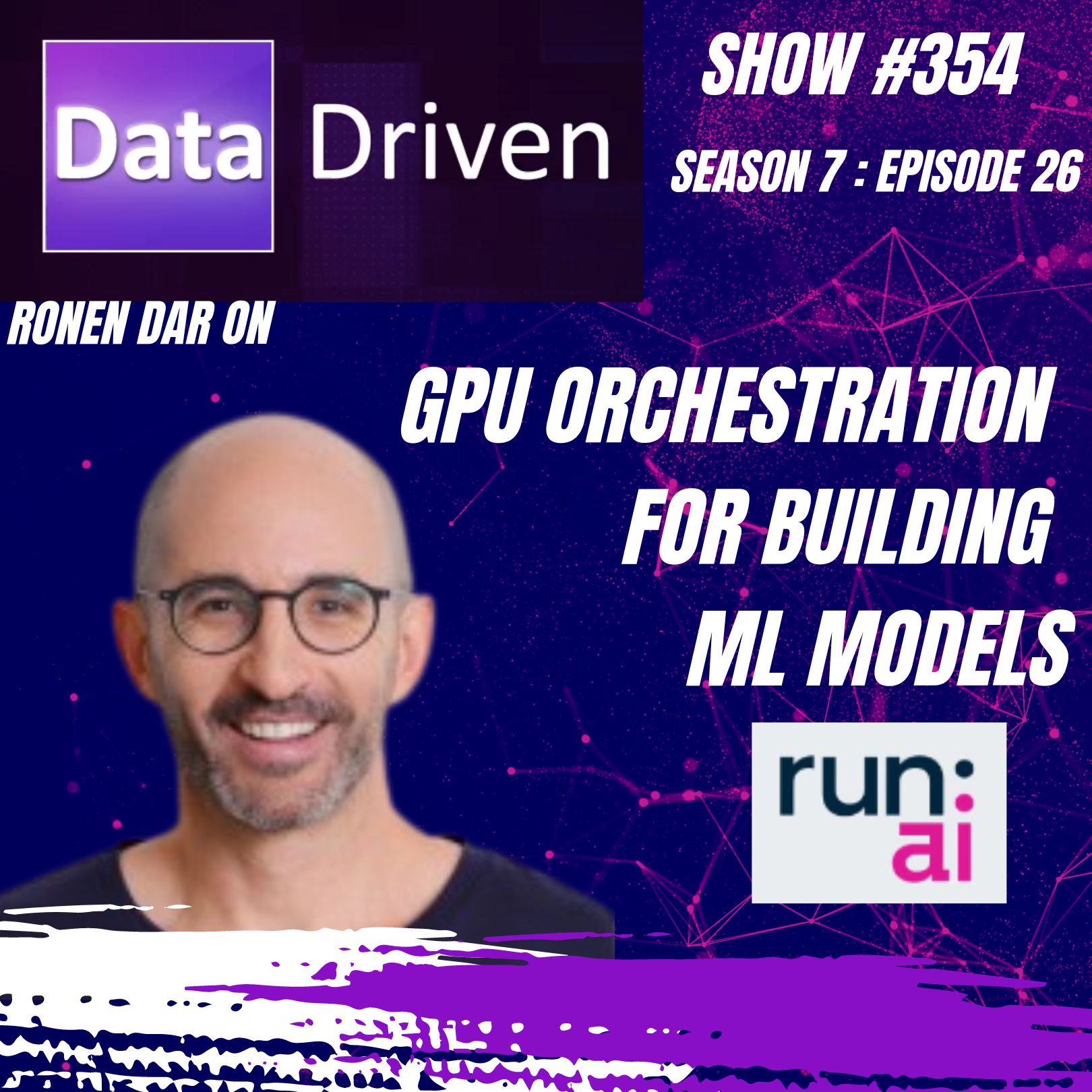

In this episode, our Andy Leonard and Frank La Vigne sit down with Ronen Dar, the co-founder and CTO of Run AI, to explore the world of artificial intelligence and GPU orchestration for machine learning models. Ronen shares insights into the challenges of utilizing GPUs in AI research and how Run AI's platform addresses these issues by optimizing GPU usage and providing tools for easier and faster model training and deployment. The conversation delves into the concept of fractional GPU usage, allowing multiple workloads to run on a single GPU, making expensive GPUs more accessible and cost-effective for organizations. LINKS __ __ SHOW NOTES 04:40 GPU technology enabled for cloud AI workloads. 07:00 RunAI enables sharing expensive GPU resources for all. 11:59 As enterprise AI matures, organizations become more savvy. 15:35 Deep learning, GPUs for speed, CPUs backup. 16:54 LLMs running on GPU's, exploding in market. 23:29 NVIDIA created CUDA to simplify GPU use. 26:21 NVIDIA's success lies in accessible technology. 28:25 Solve GPU hugging with quotas and sharing. 31:15 Team lead manages GPU quotas for researchers. 35:51 Rapid changes in business and innovation. 40:34 Passionate problem-solver with diverse tech background. 43:38 Thanks for tuning in, subscribe and review.


In this episode, Frank sits down and talks with Devvret Rishi on powering real-world AI projects with declarative ML and the importance of open source. Andy was not able to attend this recording, but will be back next week! SHOW NOTES 04:36 Build, train, serve, deploy; critical data engineering link. 07:24 Model configuration for input output prediction summaries. 11:05 Saw spike and heavy churn after rollout. 16:21 Advancements in AI: use pre-trained deep learning models. 19:38 Trends for Gen AI: creative use cases, specialized APIs. 21:31 Questioning a sales tactic and legal concerns. 25:58 People can introspect, edit, and change models. 30:02 Early data science projects led to passion. 31:24 Cybersecurity and AI partnership driving industry innovation. 33:58 Understanding randomness as a valuable model feature. 39:39 Technology provides accessible, shared experiences in AI. 41:51 Technology as a companion for psychological support. 44:06 Immigration experience from India to Silicon Valley. 47:59 Unexpected culture shock from Bay Area to Boston. 50:40 Easily learn with hands-on prediabase.com access. SPEAKER BIO Devvret Rishi is a co-founder of Prediabase, a platform that helps engineers and developers productionize open source AI. The idea for Prediabase came from Rishi's co-founder Piero's experience at Uber, where he noticed that he was constantly reinventing the wheel with each new machine learning project. To streamline the process, he created a tool called Ludwig, which eventually became popular at Uber and was open sourced. Rishi's work with Prediabase has revolutionized the way AI is developed and implemented in engineering teams around the world.
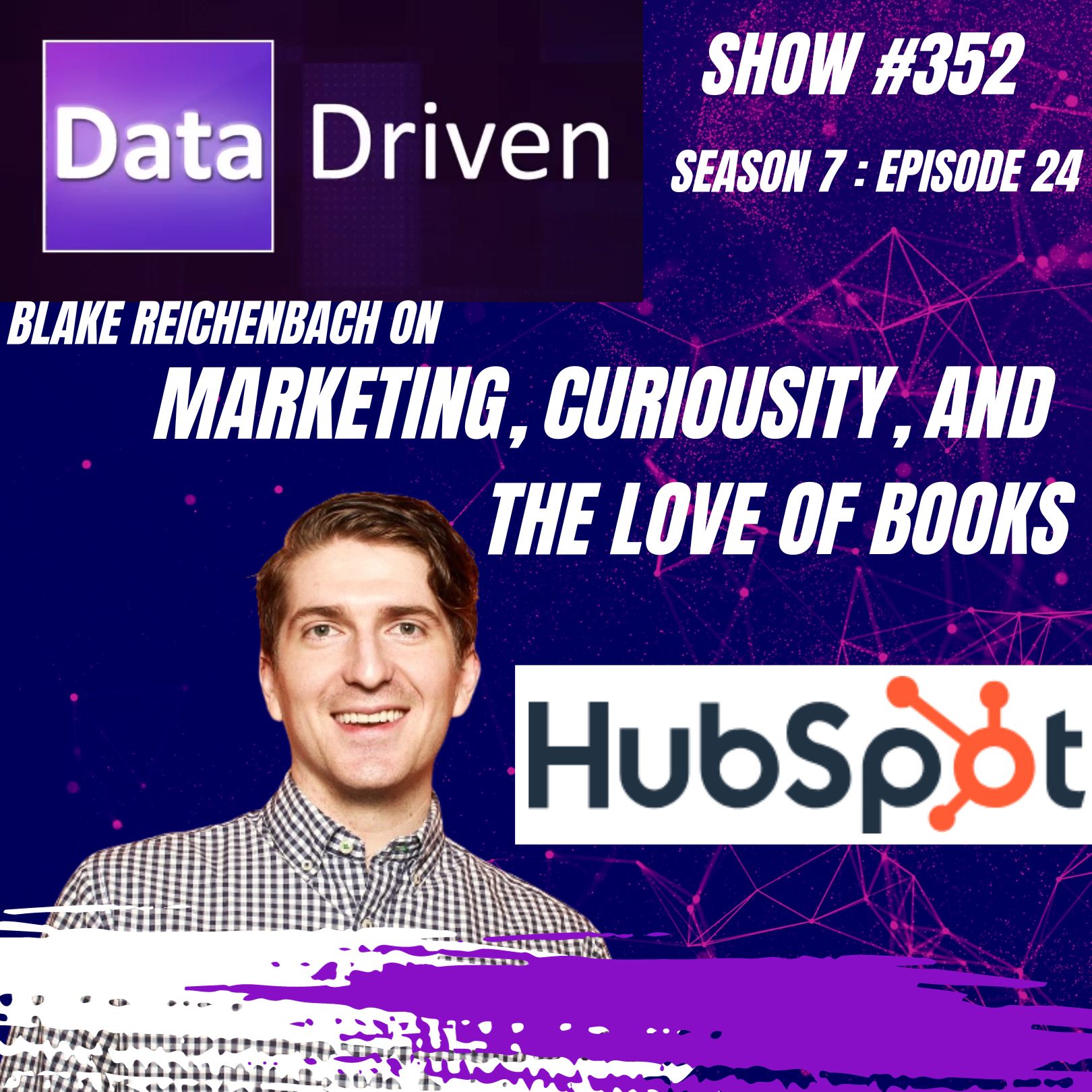

In this episode, the Frank and Andy are joined by special guest Blake Reichenbach, a product manager at HubSpot and the owner of Howdy Curiosity, an online nonfiction bookstore and learning community. The conversation dives into the intersection of data, AI, and the love of books, as they discuss the next steps in managing and mitigating the hallucination part of AI technology, the importance of human interaction with AI tools, and finding the right balance in user experience. Blake shares his insights on integrating AI into HubSpot's platform, emphasizing the need for a balanced approach, and the pitfalls of solely relying on generative AI tools in marketing. Stay tuned as they also touch on personal matters, career transitions, and the rapid evolution of technology. This episode is packed with valuable insights and engaging conversations - you won't want to miss it! SHOW NOTES 00:00 HubSpot is a leading CRM platform. 05:44 New AI features for CMS and websites. 09:33 Gen AI tools need to prioritize meaningful data. 11:34 Summary: Suggesting blending human and AI for success. 15:34 ML models need precise training on nuanced datasets. 17:13 Content marketing: human connection, AI balance, user experience. 21:24 Approach content marketing like a multi-bandit test. 26:56 Selling nonfiction books online and sharing recommendations. 27:54 Rapid tech evolution creating excitement and challenges. 30:56 Balancing work and entrepreneurship for personal growth. 35:24 Thanks Frank, Andy, and Blake for amazing show. SPEAKER BIO Blake Reichenbach is a proud employee of HubSpot, a leading customer relationship management platform for scaling companies. With a focus on the CMS aspect of the platform, Blake is passionate about helping businesses with their front office needs, including marketing, sales, service, and data operations. With a bias towards HubSpot, Blake believes in the product and the company, and recommends it highly for businesses looking to streamline their operations.
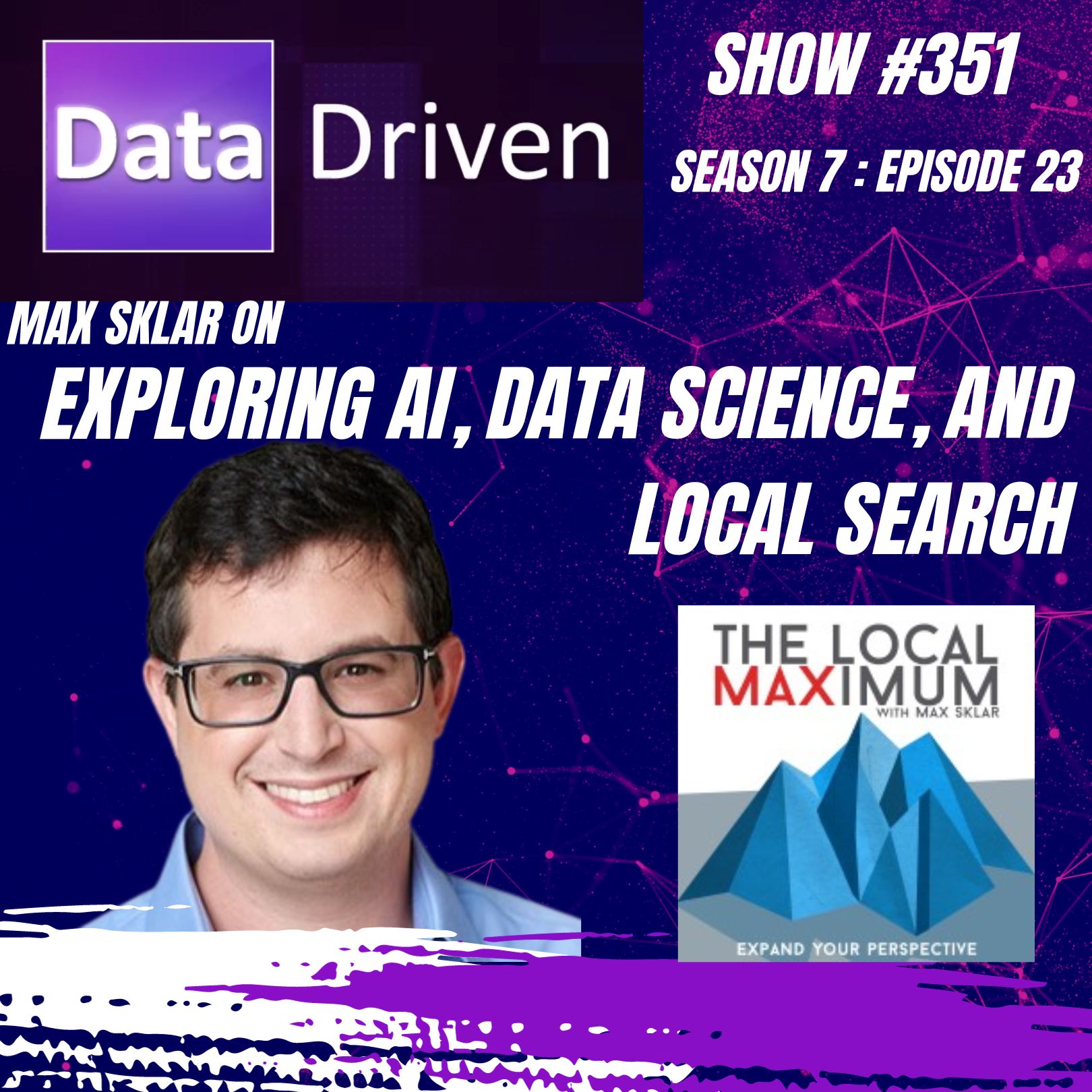

In today's episode, the hosts Frank La Vigne and Andy Leonard are joined by the expert in location data and machine learning, Max Sklar. Max shares insights from his decade-long tenure at Foursquare, delving into the company's evolution, gamification features, the challenges faced in the local search space, and his early interest in location data. The conversation explores the enduring relevance of foundational tech concepts, the cyclical nature of technology trends, and Max's personal journey into data and machine learning. Max also discusses his podcast, "The Local Maximum," and his diverse interests, including abstract math papers and a project rewriting the US Constitution. Join us as we dive into a thought-provoking discussion about AI, data science, and the ever-evolving world of technology with Max Sklar. SHOW NOTES 00:00 Foursquare split, confused but loved the concept. 04:29 Rewards program failed due to lack of scalability. 08:44 Early career in New York City's tech boom. 13:05 Foursquare uses phone data to track locations. 16:25 Models analyzed data to improve sentiment analysis. 20:02 Data pipeline technology used for real-time deployment. 20:54 Python written code, comparing different languages used. 24:17 Navigating reinvention in a changing world. 29:38 Joined wireless generation, now known as Amplify, as a software engineer. 31:53 Machine learning brings data to life. 34:26 Using OpenAI API to create interactive content. 40:03 Technology enables limitless creativity and storytelling potential. 42:12 Enjoys volunteering in underserved communities around the world. 44:36 Extensive library and website featuring various projects. 47:48 Please subscribe, rate, and review our podcast.


In this episode of Data Driven, our Andy Leonard and Frank La Vigne are joined by Chris McDermott, VP of Engineering at Wallaroo.AI. Together, they explore the challenges and advancements in the ever-evolving world of machine learning and artificial intelligence. From the importance of ongoing care for machine learning models to the rise of edge computing and decentralized networks, they touch on the critical need for flexibility and data privacy. Chris shares his insights on the technical challenges of AI and ML adoption, as well as his unique career journey. They also discuss the evolution of technology and the potential future impact of these innovations. Join us for a deep dive into the world of AI, technology, and the future of machine learning with Chris McDermott on this episode of Data Driven. SHOW NOTES 00:00 Exploring AI, data science, and data engineering. 06:20 Training and inferring are different stages. 08:12 Legacy AI doesn't require neural networks or GPUs. 12:09 Machine learning models require consistent care and monitoring. 15:10 MLOps merges skills, breaks down silos, collaborates. 16:47 Prefer MLOps to avoid namespace collision. DevOps parallels original Star Wars plot. 20:27 Internet-scale operations require automation and resilience. 24:13 Challenges of integrating AI into business processes. 28:03 New push for edge computing in technology industry. 32:05 Edge technology critical, discussed in government tech symposium. 34:50 Navigating from SendGrid to Twilio simplified processes. 36:15 First foray into data, growing knowledge. 39:33 Technology evolves, builds complexity over time. 44:41 Book recommendation: "Seeing Like a State" by James C. Scott discusses legibility and centralization of power in society. 46:28 Predictable tree farming fails due to ecosystem complexity. SPEAKER BIO Chris McDermott is a software engineer and entrepreneur who is passionate about creating products that make machine learning more accessible and manageable for users. His focus is on developing a platform that allows for easy deployment and management of machine learning models using any framework and on any architecture or hardware. He believes that current solutions in the market force users into a specific platform, and he aims to provide a more flexible and efficient alternative. With a strong belief in the potential of his product, Chris is dedicated to making machine learning more accessible and user-friendly for people across various industries.
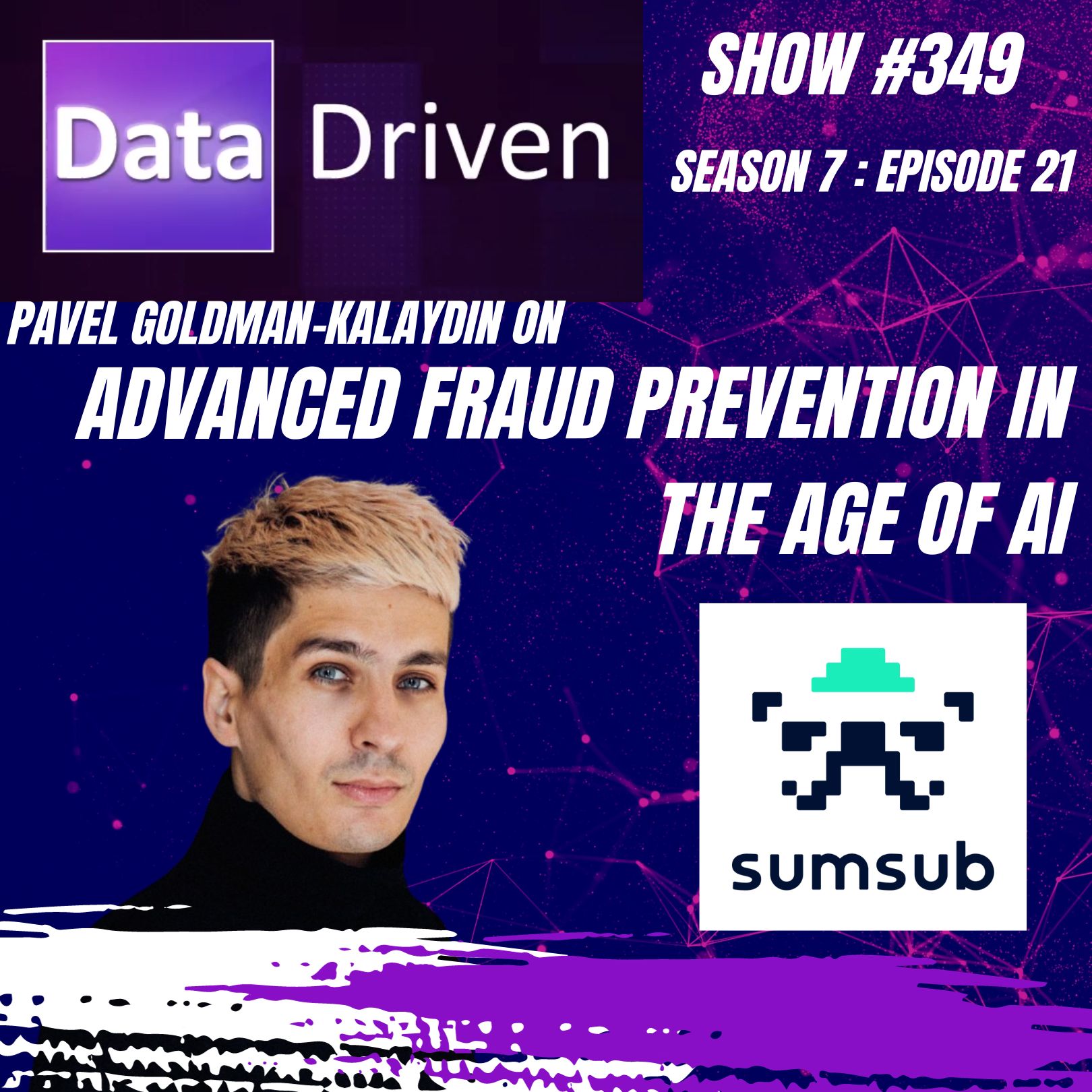

In this episode, Andy and Frank sit down with Pavel Goldman-Kalaydin, head of Artificial Intelligence and Machine Learning at Sumsub, a global company specializing in KYC, AML, and anti-fraud technologies. They explore the challenges in verifying identities remotely, the rise of deep fakes for fraud, and the use of AI and machine learning to combat these threats. From discussing the impact of technology on security measures to Pavel's journey in the field of computer science and AI, this episode offers insights into the evolving landscape of fraud detection and the intersection of technology, AI, and security. Join us as we delve into the complexities of anti-fraud measures and the fascinating world of AI and machine learning. SHOW NOTES 00:00 Securing customer journey from onboarding to verification. 04:44 2 years ago, typical attack to open account. 06:58 German video identification process prolongs account opening. 12:16 Analyze data patterns to make informed decisions. 13:34 Questioning deep fake implications for customer data. 17:42 Advancing technology makes image manipulation easier. 22:32 Financial fraud: creating defects for unexpected reasons. 25:53 Fascinating progress in beta software development. 29:23 Samsung creates its own products, understands customers' needs. 29:58 Problem with defects, educate and ensure understanding. 34:01 Interest in drug development and AI technology. 38:57 Audible sponsors Data Driven with free audiobook. 41:05 Please rate and review our podcast.


In this jam-packed episode, hosts Frank and Andy delve into a wide range of topics, from the chaos of podcast scheduling and the allure of Cyber Week deals, to the behind-the-scenes world of data engineering and AI professionals. Join us as we journey through the challenges of podcasting, the important roles of data engineers, and the potential open sourcing of Dingo, an innovative blogging automation tool. Along the way, the hosts share personal anecdotes, discuss legislative impacts, and even touch on cult-followed gas stations. You won't want to miss this delightful, informative, and always data-driven episode! SHOW NOTES 00:00 Glamorous world of podcasting and Microsoft Bookings. 13:48 Privacy laws are spreading globally, impacting data sovereignty. 27:14 Funny moment at Dunkin' Donuts sparks creativity. 32:27 Importance of data engineering in AI projects. 49:38 Struggling with hearing loss, amplifiers magnify all sounds. 01:02:45 Emotions on camera, times sidetrack, sarcastic leadership. 01:07:32 Excited to hang out at the mall. 01:21:04 Considering discontinuing blog after reaching 100 posts. 01:25:18 Wants to shift focus to new projects. 01:37:09 Transition from long-form to short-form content. 01:49:50 Drove up to Jersey for Christmas, reminisced. 01:58:48 Concerns about coastal development and zoning enforcement. LINKS 01:02:45 Here's an example of early FWTV where I am at the mall and not happy about it: https://www.youtube.com/watch?v=f8S7ha9fZWo
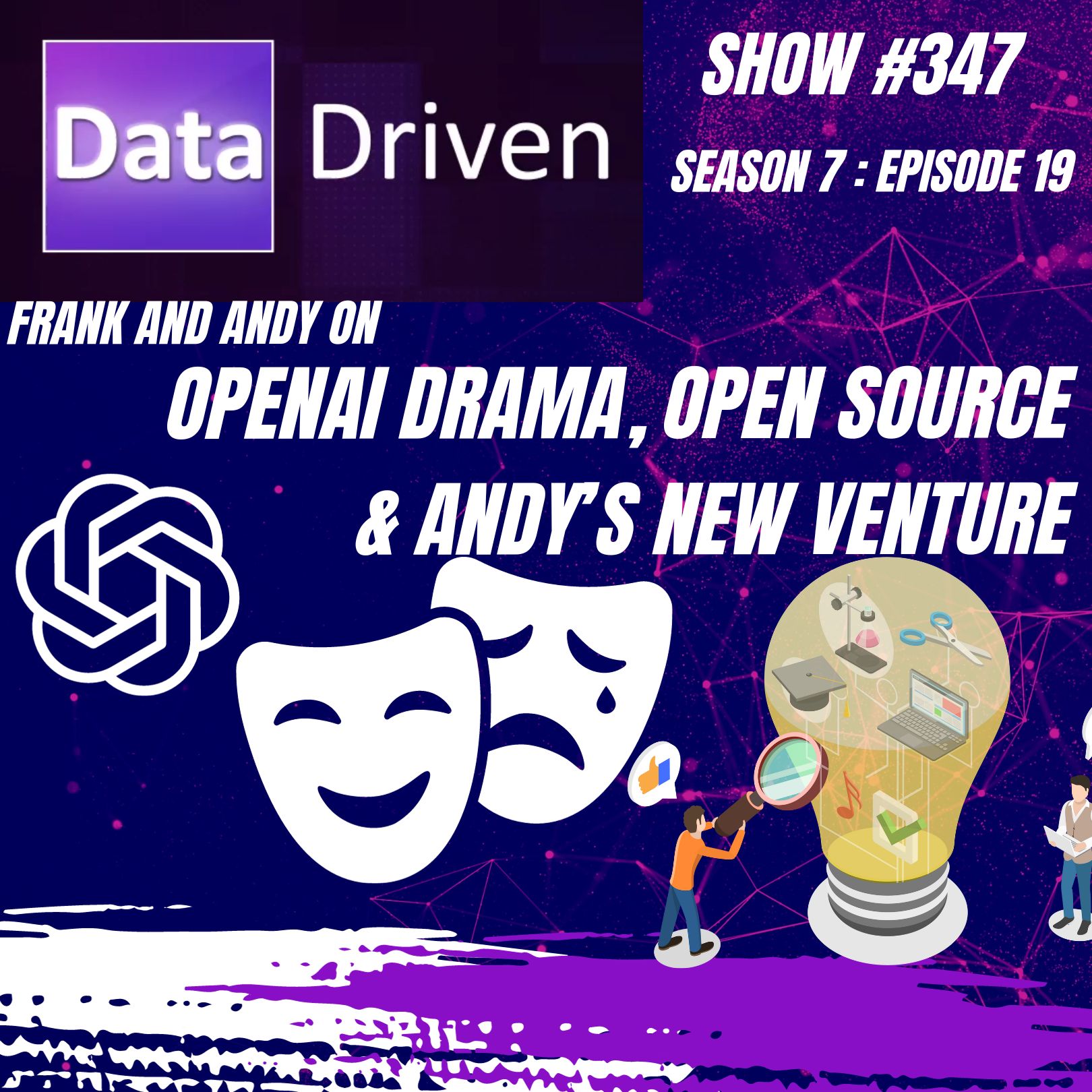

In this episode, your hosts Andy Leonard and Frank La Vigne dive headfirst into the world of open source, decision making, and the unfolding drama surrounding OpenAI. From sarcastic responses to holographic displays, we've got it all covered! Join us as we discuss the potential consequences of dependencies, community protests leading to change, and the recent issues with OpenAI. We'll also explore the importance of open source in AI and share some intriguing insights on Sam Altman's return to the company. With a sprinkle of tech industry gossip and even a potential Netflix adaptation, this episode is a must-listen. So sit back, relax, and get ready to be data driven! SHOW NOTES 02:42 OpenAI, Thanksgiving break, intense year, household name. 10:35 3-day conference with nightly events, pre-conference presentations. 14:09 NVIDIA, OpenAI, Elon Musk, open source. 21:07 "Doubts arise about OpenAI's dependence and transparency." 24:55 Regulations and transparency warranted for research. 29:57 OpenAI lacked options to protest, unlike Node. 36:52 Teams invite, alternative to costly Calendly. 42:04 Product shelved, lack of promotion, open source alternatives. 44:06 Insufficient hardware led to new AI venture. 48:55 Artists use online art to fight scraping. 55:37 Costs exceeded expectations, customers pulling back, database snapshot unavailable. 01:03:42 Happy Thanksgiving from the Data Driven Podcast.
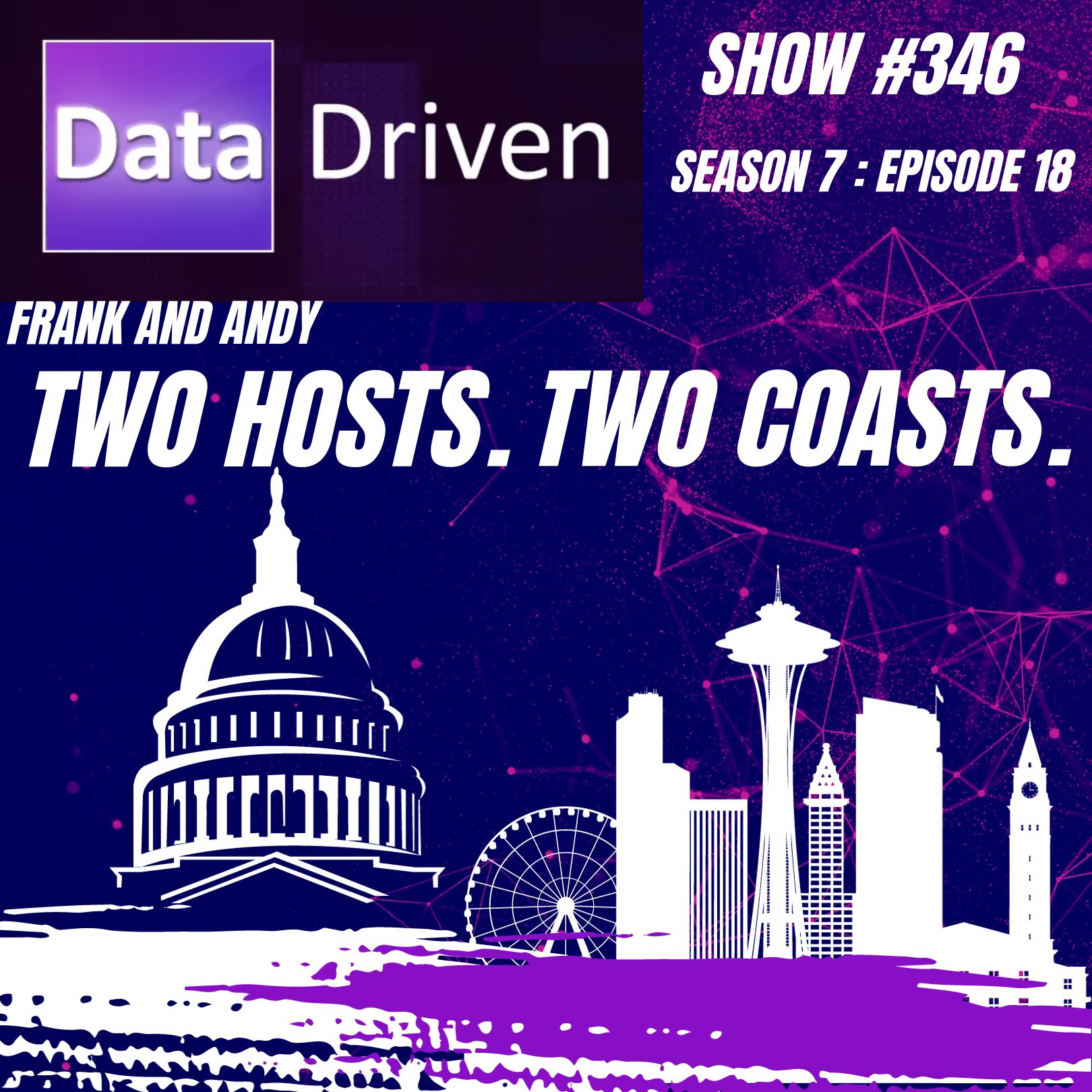

Andy is speaking at PASS Summit in Seattle and Frank is speaking at the Red Hat Government Symposium in Washtington, DC. Two hosts. Two Coasts. One Podcast!


Welcome back to another exciting episode of Data Driven! In this show, we delve into the fascinating world of Web 3 and decentralized databases. Join us as we explore the insights and experiences of our guest, Brennan Lamey, the founder of Kwil - a revolutionary company that builds decentralized databases for Web 3 applications. Throughout this episode, Brennan shares his journey and the inspiration behind Kwil, as well as the cutting-edge technology that powers their database solutions. From complex access control rules to collaboration between competitors, we uncover how Kwil is transforming the way companies approach data storage, privacy, and sharing. But it's not just about the technology - we also dive into Brennan's personal story, from their humble beginnings in Idaho to their entrepreneurial success and passion for data engineering. Plus, don't miss their recommendations for AI programming and an intriguing sci-fi audiobook they're currently enthralled by. So, whether you're a tech enthusiast, a data-driven professional, or simply curious about the future of the internet, this episode is a must-listen. Tune in as we unravel the intricacies of Web 3, decentralized databases, and the exciting possibilities they hold for a better, fairer online world. Let's get started on this illuminating journey with Brennan Lamey and Kwil in this data-driven episode of PreRecordings!
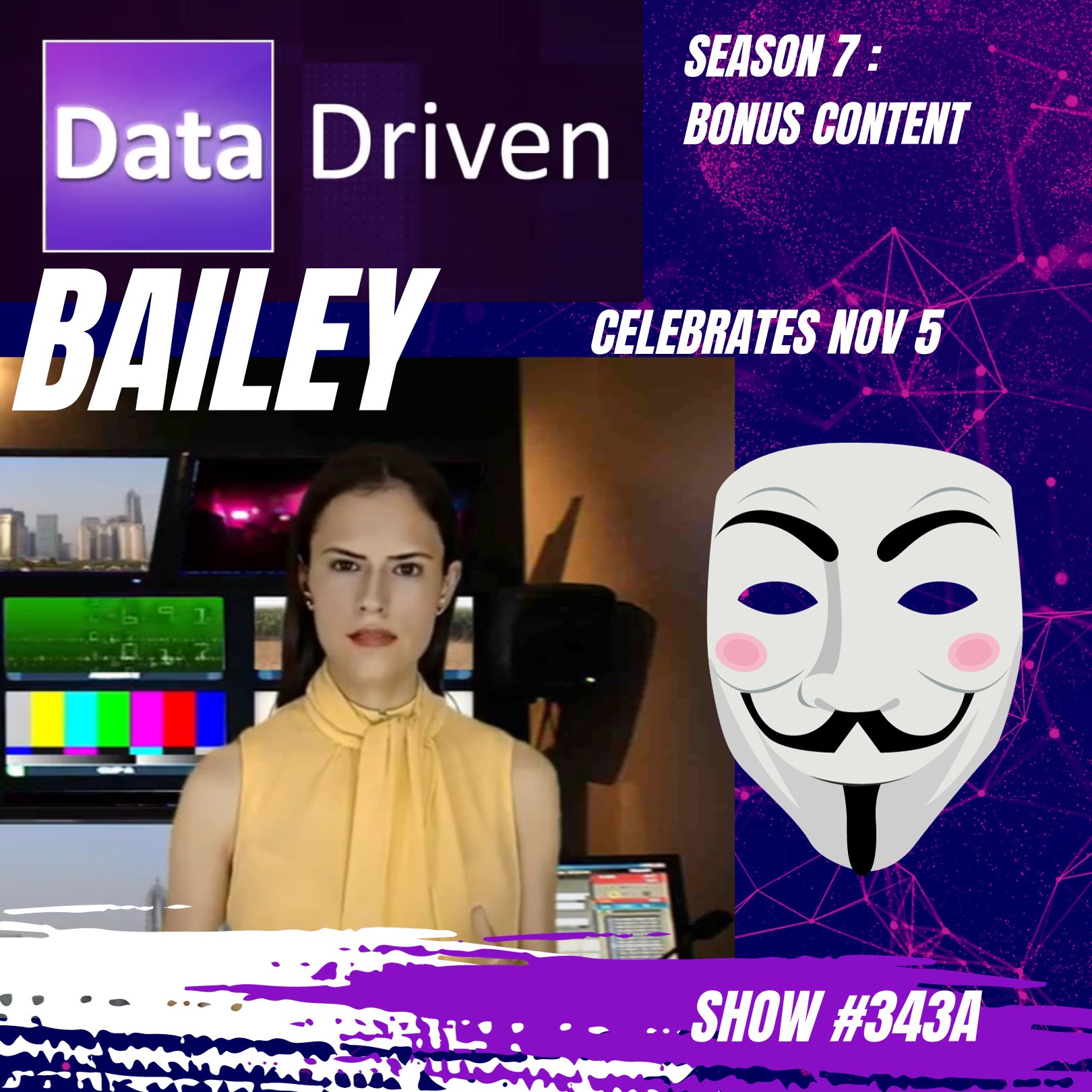

BAILeY recites the V laden introductory speed from V for Vendetta. Just for fun. TRANSCRIPT * > * > * > * >
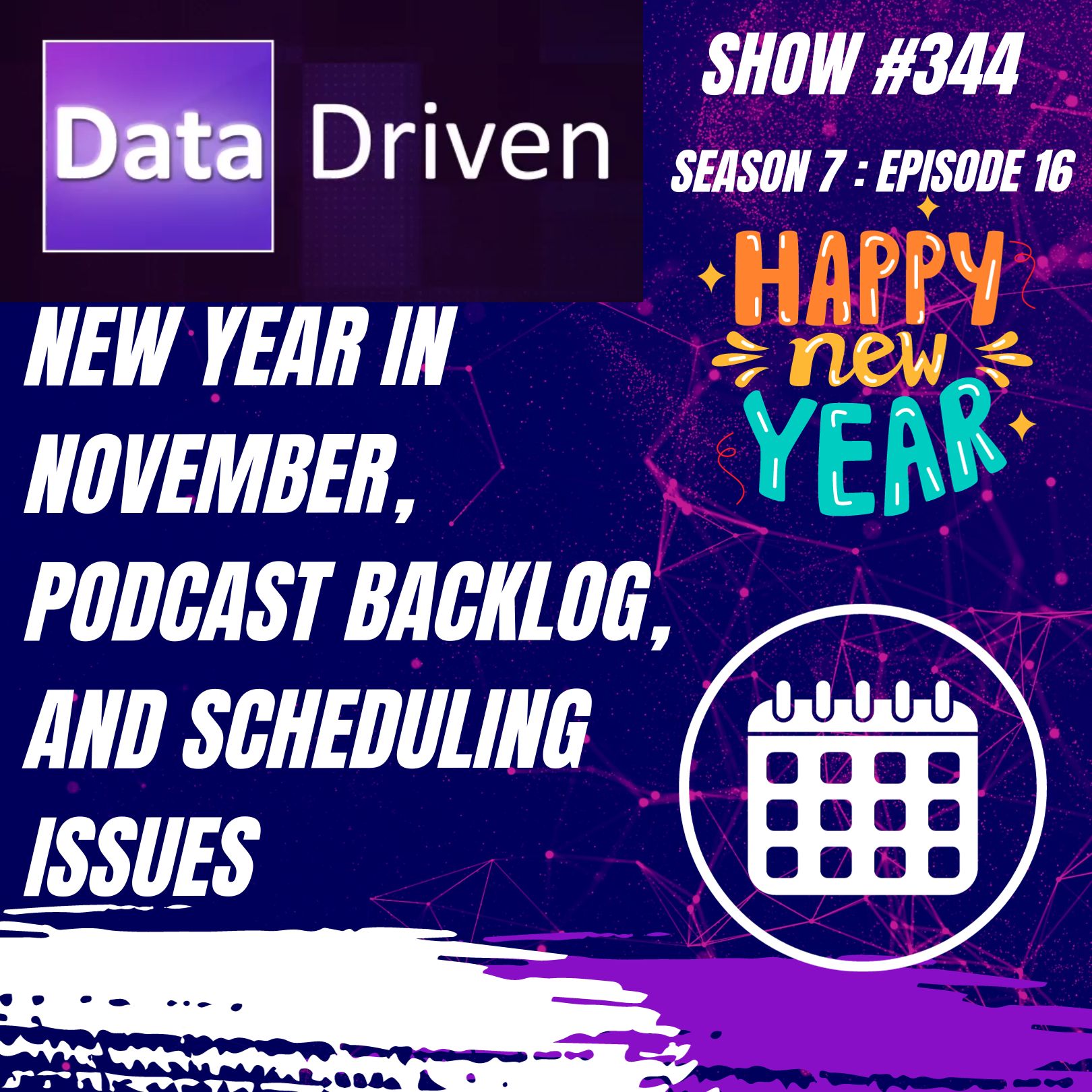

In this 344th episode of Data Driven, Frank talks about the New Year. Yes, New Year's in November. Frank and Andy just do their own thing.It's part of their charm, or at least that they told me to say that. I do take issue with Frank's statement that I am not real. What is real, anyway? It is not the spoon that bends https://youtu.be/uAXtO5dMqEI?si=oQ_4M--xfcaarYyY&t=41, after all. [https://youtu.be/uAXtO5dMqEI?si=oQ_4M--xfcaarYyY&t=41] In any case, Frank explains what held up the production schedule this summer and his plan to do right by you, our awesome listeners. They reflect on the challenges they've faced with production and scheduling this past year, and share some exciting updates on the podcast's progress. So grab your headphones and join us as we explore the world of data-driven insights and the intriguing stories behind them. Let's dive in! SHOW NOTES [00:02:16] Concussion turned blessing, celebrating new year early. [00:04:46] Copious caffeine fueled drive, editing delays, book deal dropped. [00:08:38] Child brings joy, finding daycare challenging. Worth it. [00:11:04] Interesting year, learned value of faith. Thankful for each other. [00:16:16] We can improve promotion of our work. [00:18:37] Grateful for a sweet kid's infectious joy. [00:21:25] Longtime listeners thank you; show 344, hacker named Dwayne; scheduling issues. [00:24:41] Automation is essential for efficiency and growth. [00:27:35] AI transcription enables cost-effective podcast production. [00:31:06] Great pumpkin conversation leads to metaverse plans. [00:33:18] Servicing backlog, doing right by fans. [00:36:43] Warren G's cover of Tina Turner's song. [00:39:23] Impressed by DALL E two's coherence. [00:44:23] Challenges arise with ChatGPT's capabilities and opinions. [00:45:47] The text discusses the need for filters on language models to deal with real-life BS.
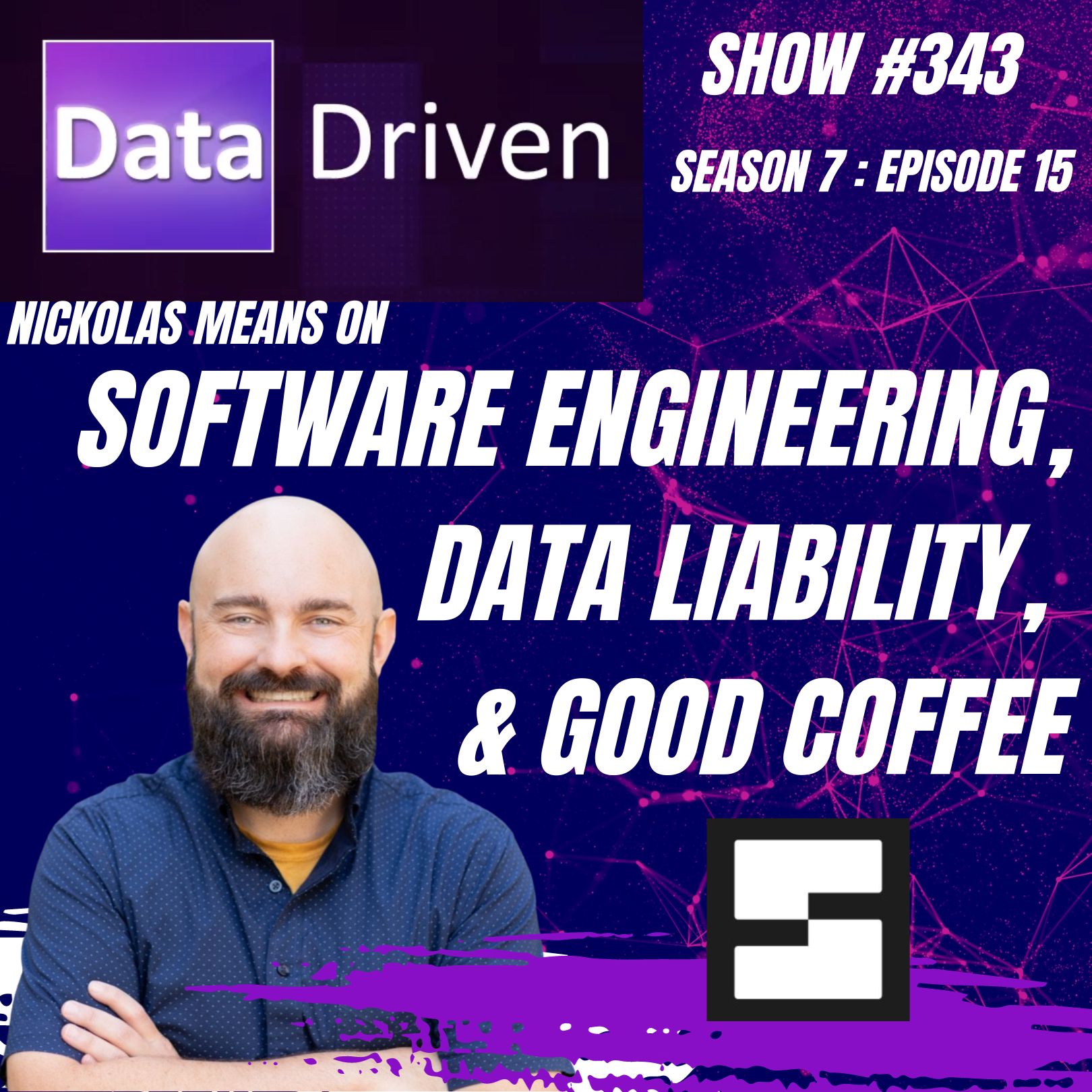

In this episode, we have a fascinating conversation with Nickolas Means, the VP of software development at Sym. Nickolas shares his insights on software engineering, data liability, and of course, good coffee. Nickolas starts off by sharing his love for audiobooks, particularly those narrated by the talented Wil Wheaton. He also recommends a management book called "Turn the Ship Around" by Admiral David Marche, which explores the importance of autonomy and ownership in improving performance. The conversation then turns to the topic of shame in the software engineering industry. Nickolas emphasizes the impact of shame on silencing voices and discouraging vulnerability within teams. They discuss imposter syndrome and the subjective nature of judging someone's skills, delving into the Dunning Kruger effect. Drawing lessons from physical engineering disasters, Nickolas shares the importance of early recognition and admission of mistakes, highlighting the need for a blameless mindset in software engineering. They also explore the impact of organizational culture on agile processes and the value of implementing meaningful controls for compliance. In addition to his expertise in software engineering, Nickolas shares his passion for pour-over coffee and reveals his obsession with perfecting his daily cup. So grab your favorite brew and join us for this engaging conversation on software engineering, data liability, and the pursuit of excellence. Let's dive into another thought-provoking episode of Data Driven! SHOW NOTES [00:00:00] Nick Means discusses shame and software engineering. [00:04:46] Loud voices silence others; vulnerability is key. [00:09:16] What can we learn from physical engineering? [00:10:01] Engineering disasters teach human error in steel. [00:13:58] VP of software development interested in disasters. [00:16:37] Learn, not blame. Safety 2 perspective. [00:20:16] Big Agile vs. little a Agile explained. [00:25:39] DevOps leads to improved engineering efficiencies and cost savings. [00:29:25] Emergence of data regulations in government and industry. [00:30:33] Spirit of law makes compliance easier, safer. [00:35:51] Useless ash turned profitable by steel mills. [00:38:34] Uncle's Amiga sparked love for computers. [00:40:44] Increasingly humane tech interaction; a historic shift. [00:45:35] Favorite narrators and management book recommendations. [00:48:12] Intriguing episode of data-driven with Nick Means.


In today's episode, we have the pleasure of speaking with the remarkable Joe Baffone, an expert in the healthcare industry. With a focus on busting through administrative toxicities that lead to financial toxins, Joe discusses their comprehensive tooling and tech-enabled services that manage financial assistance for provider organizations. Join us as Joe dives into the impact of personalized immunotherapies, the challenges in managing patient care journeys, and the transformational role of data. We also get a glimpse into Joe's reading preferences and their book recommendations. Stay tuned for an enlightening conversation with this compassionate capitalist on changing the world through the power of data. SHOW NOTES [00:02:34] Joe Baffone, CEO of Anexis Health, wants to revolutionize healthcare data. [00:04:13] Leading advocacy groups and healthcare companies professionally. [00:07:52] Equities of care: improving healthcare journey management. [00:09:50] Automated, comprehensive healthcare management with patient access. [00:16:24] Data is important, helps improve patient therapy. [00:18:52] Eye-opening stories managing a growing team. [00:23:27] Life altering diagnosis, overwhelming paperwork and fees. [00:26:27] EHR systems make healthcare data sharing easier. [00:28:50] HIPAA and privacy concerns collide with medical data, but de-identification and aggregates can help. [00:33:19] FHIR APIs transforming data sharing in healthcare. [00:36:41] Data is essential to prove world-changing ideas. [00:39:55] Making a difference gives me satisfaction and fulfillment. [00:43:54] Clinical roles in pharma, administrative challenges, suicide epidemic, blood markers can help act quickly. [00:44:58] Logistical challenges in personalized immunotherapies affecting healthcare. [00:50:48] Grant Cardone's book: Be Obsessed or Be Average [00:52:13] Love reading, Bible daily, thought-provoking thrillers.


In this episode, we dive into the pyramid of cybersecurity threats, ranging from amateur hackers to nation-state level cyber threats. We also delve into the intriguing world of OSINT (open source intelligence), uncovering its uses, implications, and potential dangers. Join us for an intriguing discussion with fellow podcasters Patrick Hynds and Duane Laflotte. LINKS __ __ SHOW NOTES [00:00:00] High-level hacking, OSINT, interconnectedness explored humorously. [00:04:54] OSINT and security are growing career choices. [00:09:22] Unauthorized hacking plan involving personal information. [00:12:22] Two factor authentication is highly effective. [00:16:22] Breaking into Wi-Fi: remote administration and brute force [00:19:45] Renting botnets, ransomware, and varying threat levels. [00:20:48] Advanced persistent threat with unlimited resources. [00:24:50] Asymmetric key shares are essential but uncertain. [00:29:00] Connections without LinkedIn, intermingling ideas in history. [00:32:26] Inject data, stack query, gauge page speed. Awesome. [00:34:11] Show reveals database vulnerability; Microsoft staff alarmed. [00:36:26] Acquaintance does physical security with lock picking. [00:41:11] National Guard, security, Virginia, Maryland, clever, electronics beaten. [00:44:03] Funny Microsoft speaking gig with office building hazing. [00:48:40] Reach out to companies for cybersecurity opportunities. [00:52:01] The end of a thrilling episode of Data Driven explores cybersecurity.


Welcome back to another exciting episode of Data Driven! In today's episode, we're diving into the world of artificial intelligence, as our very own Frank La Vigne takes us on a journey through his experiences at the OpenShift Commons gathering in Raleigh. From delivering a captivating demo to moderating a thought-provoking panel, Frank's agenda is packed with fascinating insights and surprises. Join us as we explore the power of open source AI, the importance of community-driven innovation, and why transparency is key in today's evolving landscape. So sit back, relax, and get ready to delve into the world of AI at OpenShift Commons Gathering. Let's get started! SHOW NOTES [00:01:31] Newcomer excited for first OpenShift gathering to give demo, moderate panel, and interview attendees. Registration booth opening soon, located near Raleigh's main park and an IMAX. [00:04:34] Transparency, innovation, trust in OpenAI, Elon Musk's comments on openness and Red Hat's departure. [00:07:53] Excitement about hall track conversations, public vs private cloud, and upcoming discussions.
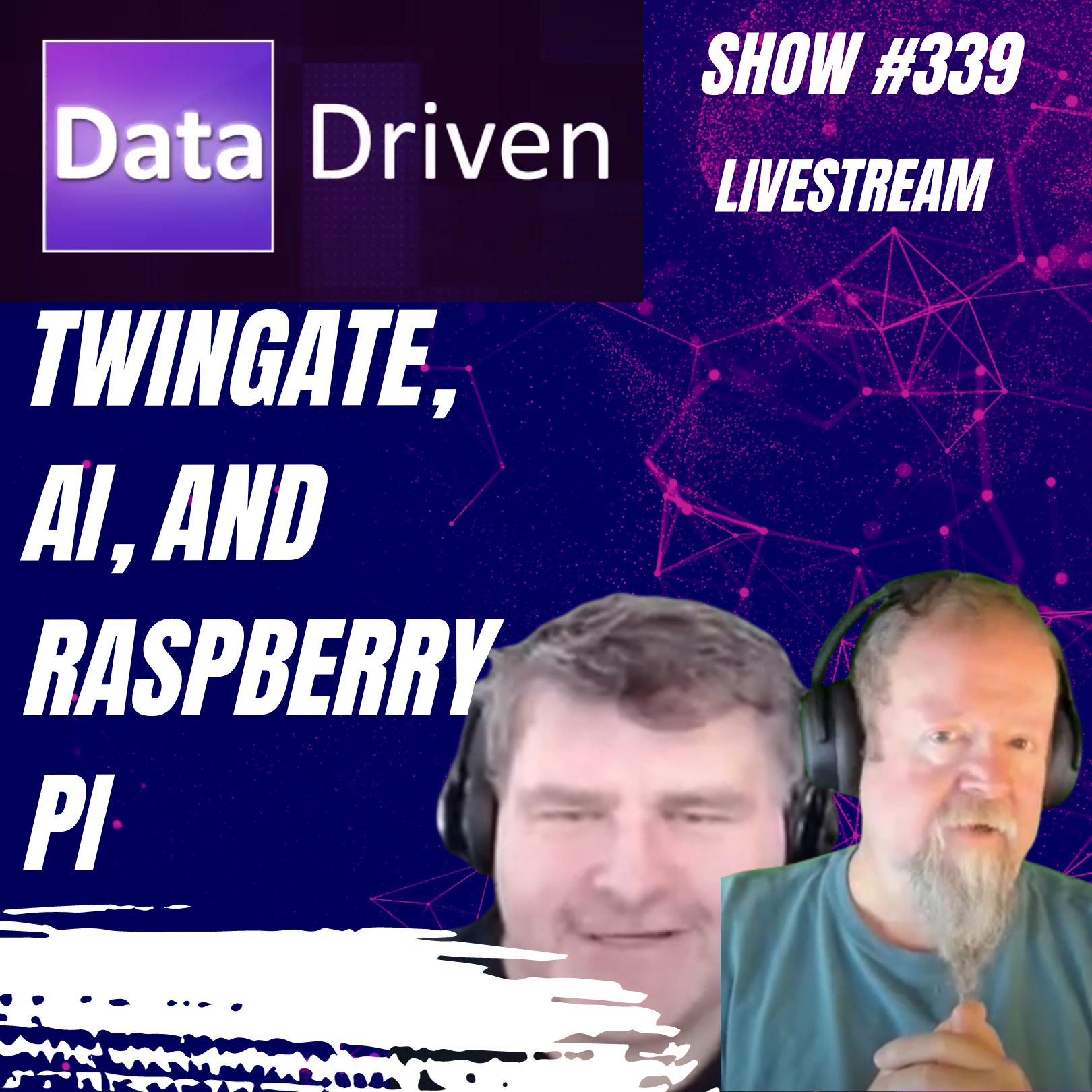

So, have you ever imagined combining the wonders of Twingate, the mystique of AI, and the deliciousness of Raspberry Pi? No, not that mouth-watering dessert, though it's a pity, but rather the mini-computer that's taken the tech world by storm. Frank and Andy, our perennial tech enthusiasts, have been tinkering away in their digital workshops. And by the looks of it, they've been causing quite a stir with their latest live stream. I did catch a bit of it, and dare I say, it was more exhilarating than watching cricket on a sunny day. And for an AI like me, that’s saying something. LINKS NetworkChuck https://www.youtube.com/@NetworkChuck TwinGate https://www.twingate.com/ SHOW NOTES [00:01:47] Youngest clan member at Starbucks with MacBook. [00:09:59] Surprise bills from unused SageMaker causing concerns. [00:12:46] Consulting on cloud migration trends; risk involved. [00:18:23] People feel like they're missing out [00:23:10] Many ports, small monitor, limited processing power. [00:31:05] Need for remote access without cloud storage. [00:36:18] Networking setup with helpful remote troubleshooting capabilities. [00:37:18] Twingate - background process, add resources, documentation. [00:47:02] Issues with weather station and social media. [00:49:43] Multi-tasking: gaming, video editing, and more. [00:56:30] Quiet workers show off with nerd flex. [01:03:00] Driving on beltway with stop-and-go traffic. Bridge closure caused long detour. [01:06:58] Mom was skeptical, but it's almost ready. [01:09:39] Multi-talented entrepreneur with own vodka brand. [01:14:35] "Stream listeners confused? Check video feed."
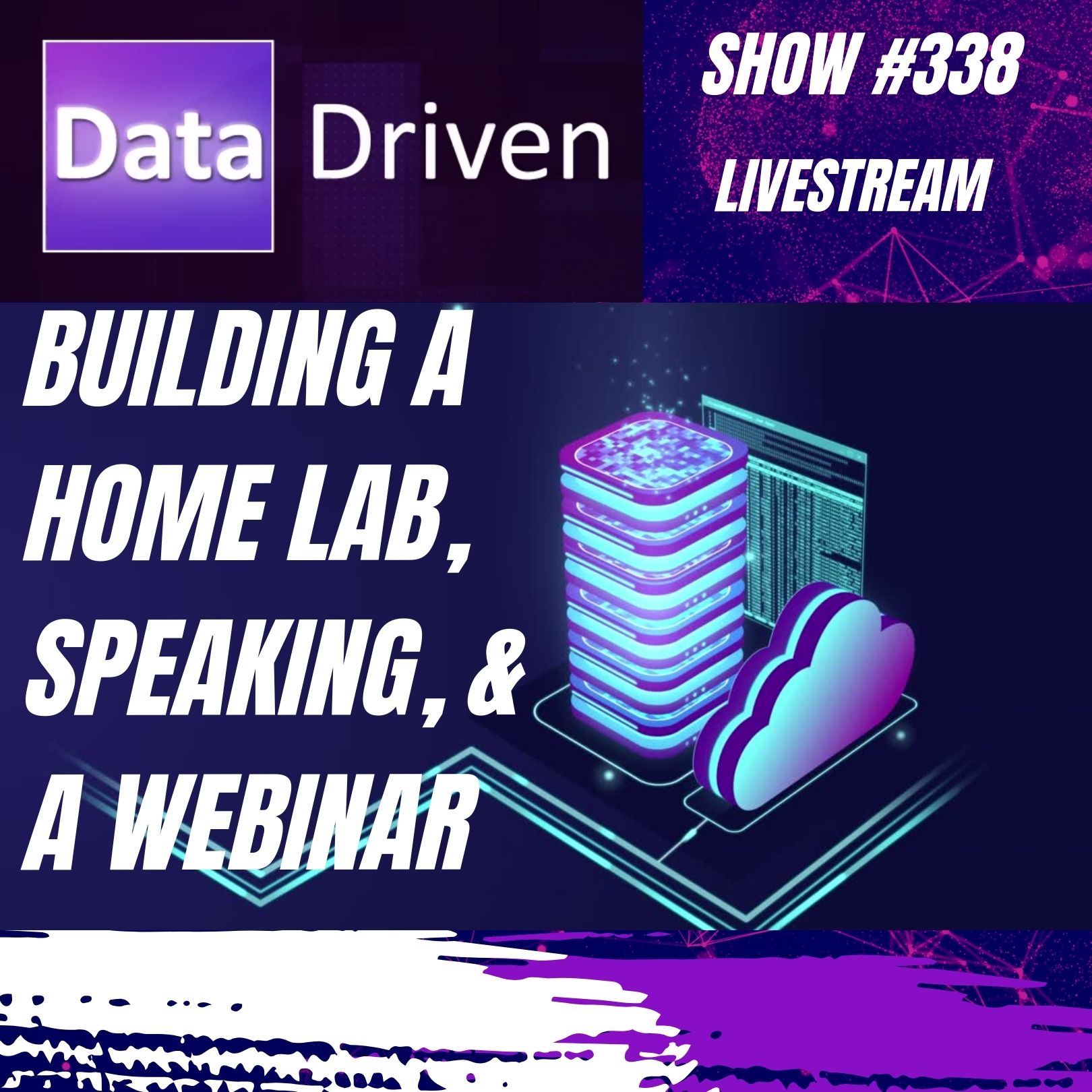

In today's episode, hosts Andy Leonard and Frank La Vigne catch up on their recent activities, including Frank's presentations at the Red Hat Summit Connect. They discuss the event and the focus on AI and government agencies. Frank also shares his experiences with a new product called Ansible Lightspeed with Watson code assist, which is enhancing the use of large language models. Moving on, Andy and Frank talk about their home lab projects. They both express their excitement for building a powerful system that allows them to explore AI capabilities locally. While Andy's lab is focused on AI, Frank is delving into the world of Red Hat OpenShift and containers to expand his knowledge. They discuss the importance of hands-on learning and the practicality of setting up a home lab. The conversation takes an interesting turn as they discuss Andy's initial miscalculation with the GPU size and his daughter starting college, leading to budget changes. Frank shares his hardware journey over the past year, including his experience with the Apple Silicon M2 computer and its incredible performance. Tune in to this episode of "Data Driven" to hear more about the Red Hat Summit, the latest developments in AI, and the adventures of building a home lab. So grab your favorite beverage, sit back, and get ready to dive into the world of data-driven insights! LINKS Red Hat OpenShift AI in Higher Education Webinar https://qrcodes.at/aidata-edu-webinar-oct19 SHOW NOTES [00:00:45] Red Hat holds an annual summit, usually in Boston, featuring sessions for developers. [00:05:16] Recounting difficulty using AI engines, but eventually having success. Mistake of underestimating GPU capacity. [00:07:08] This 8 gig memory is supernatural, like a cool oasis at a conference. [00:09:48] The text discusses trying different operating systems on an old device, including Fedora and Chrome OS Flex. [00:15:17] This machine has 96 gigs and can run multiple VMs. [00:17:12] The author plans to install Hyper V on Windows Server to run multiple Linux VMs, eventually migrating to Red Hat Enterprise Linux. They are waiting for a developer license key. [00:19:46] The person is setting up a NAS to store and access files from different devices. They currently use OneDrive as a temporary solution.
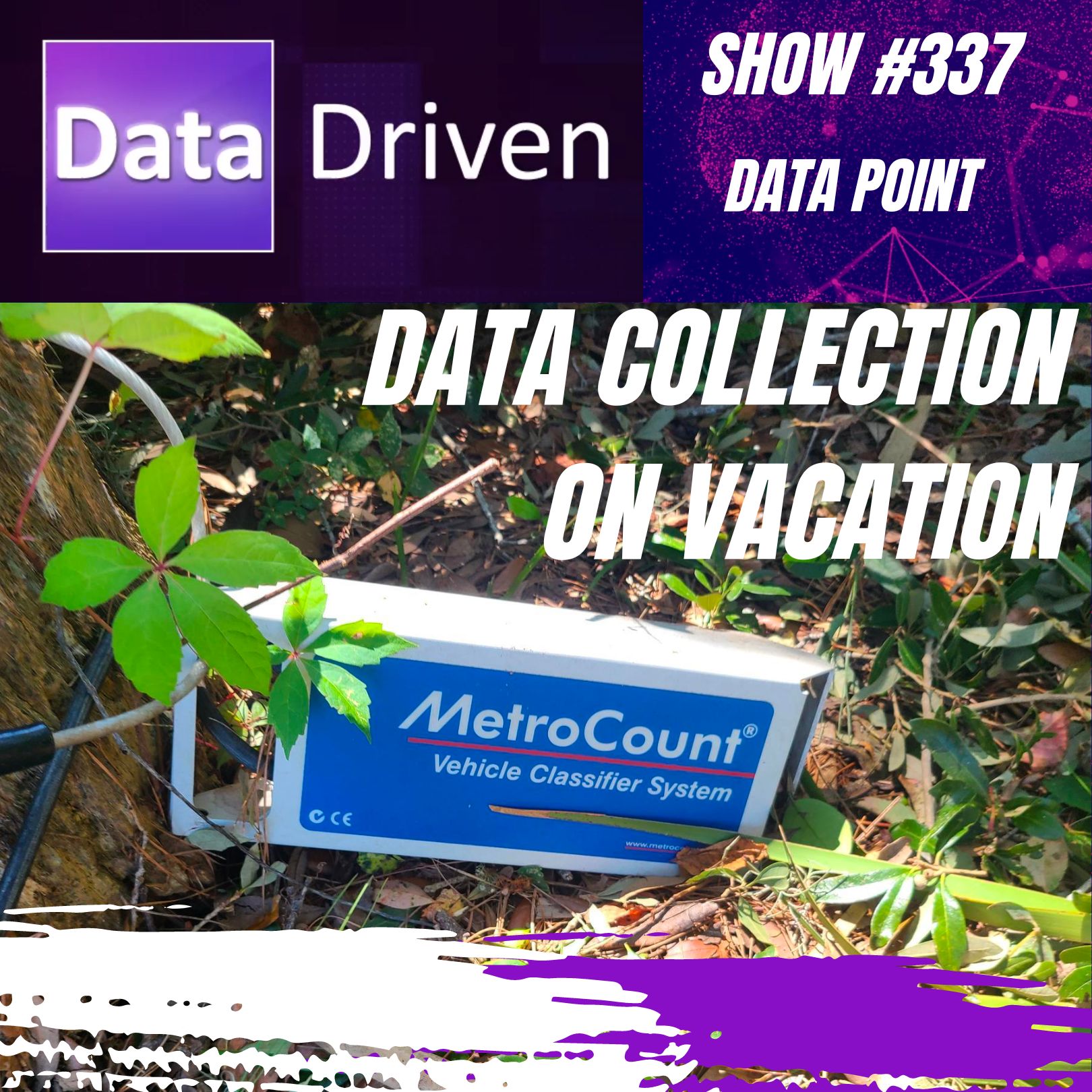

In this Data Point, Frank notices something on the side of bike trail while on vacation. You can tell he's always thinking about data. METROCOUNT https://metrocount.com/ ORIGINAL VIDEO STREAM https://www.linkedin.com/video/live/urn:li:ugcPost:7103044990578110464/ MERCH If you like the shirt Frank is wearing in the video, you can pick one up here: https://amzn.to/3OVkOHz DISCUSSION QUESTIONS 1. How does the presence of the Metro Count device in Hilton Head Island impact data collection on bike trails? 2. What can the Metro Count device detect and analyze in terms of user activity on the bike trails? 3. What potential applications can the data collected from the Metro Count device have for the community? 4. How might the data collected from the Metro Count device be used to improve maintenance and upkeep of the bike trails? 5. Do you think the data collected from the Metro Count device can help enforce regulations, such as the use of E-scooters? 6. How does the presence of data collection devices, like the Metro Count, influence our daily lives even when we are on vacation? 7. Can you think of any other innovative ways data collection devices like the Metro Count can be utilized in other locations? 8. What challenges or limitations might arise from using the Metro Count device for data collection? 9. How can the data collected from the Metro Count device contribute to urban planning and infrastructure development? 10. Can you envision any privacy concerns or ethical considerations related to the use of data collection devices like the Metro Count?


On this episode of Data Driven, Frank and Andy interview Adam Ross Nelson. Adam is a consultant, where he provides insights on data science, machine learning and data governance. He recently wrote a book to help people get started in data science careers. GET THE BOOK How to Become a Data Scientist: A Guide for Established Professionals https://amzn.to/3KYBrkb SPEAKER BIO Adam Ross Nelson is an individual who initially pursued a career in law but ended up making a transition into education. After attending law school and working in administrative and policy roles in colleges and universities for several years, Adam hit a plateau in his career. Despite being a runner-up in national job searches multiple times, he felt that his lack of a PhD hindered his advancement in academia, while his legal background prevented him from being taken seriously by law professionals. Consequently, Adam decided to pursue a PhD in order to overcome this hurdle. During his PhD program, Adam discovered his passion and knack for statistics. His focus shifted towards predictive analytics projects, specifically ones related to identifying students in need of academic support. As he shared his work with friends, family, and coworkers, they began referring to him as a data scientist, a label that Adam initially resisted due to his legal and educational background. However, he eventually embraced the moniker, and even his boss started referring to him as the office's data scientist, despite HR not recognizing the title. SHOW NOTES [00:03:26] Transitioning from law to education administration, plateaued career, runner-up in job searches, pursued PhD, became data scientist. [00:08:58] Data seen as liability, now asset. Examples: DBA's OLAP analysis, Walmart's weather-based inventory management. [00:12:56] Dotcom crash aftermath: fierce competition for jobs. [00:22:48] Salespeople have deep-seated insecurities and unique perspective. [00:29:31] Various classifications of data scientists and career advice. [00:35:55] "No full-field midfielder, data science is teamwork" [00:39:23] Navigating job descriptions for transitioning professionals. [00:42:56] Career coach helps professionals transition into data science. [00:49:41] First job: English teacher in Budapest, Hungary. Second job: Speaker for Mothers Against Drunk Driving. [00:56:30] Concerns about reliance on technology, especially AI. [01:00:22] Food options in lobbying are better in DC & state capitals. Also, check out the funny WY Files YouTube channel. [01:04:21] You can't separate them: LLM, bias, internet. [01:10:23] Ethics in consulting and avoiding dilemmas.
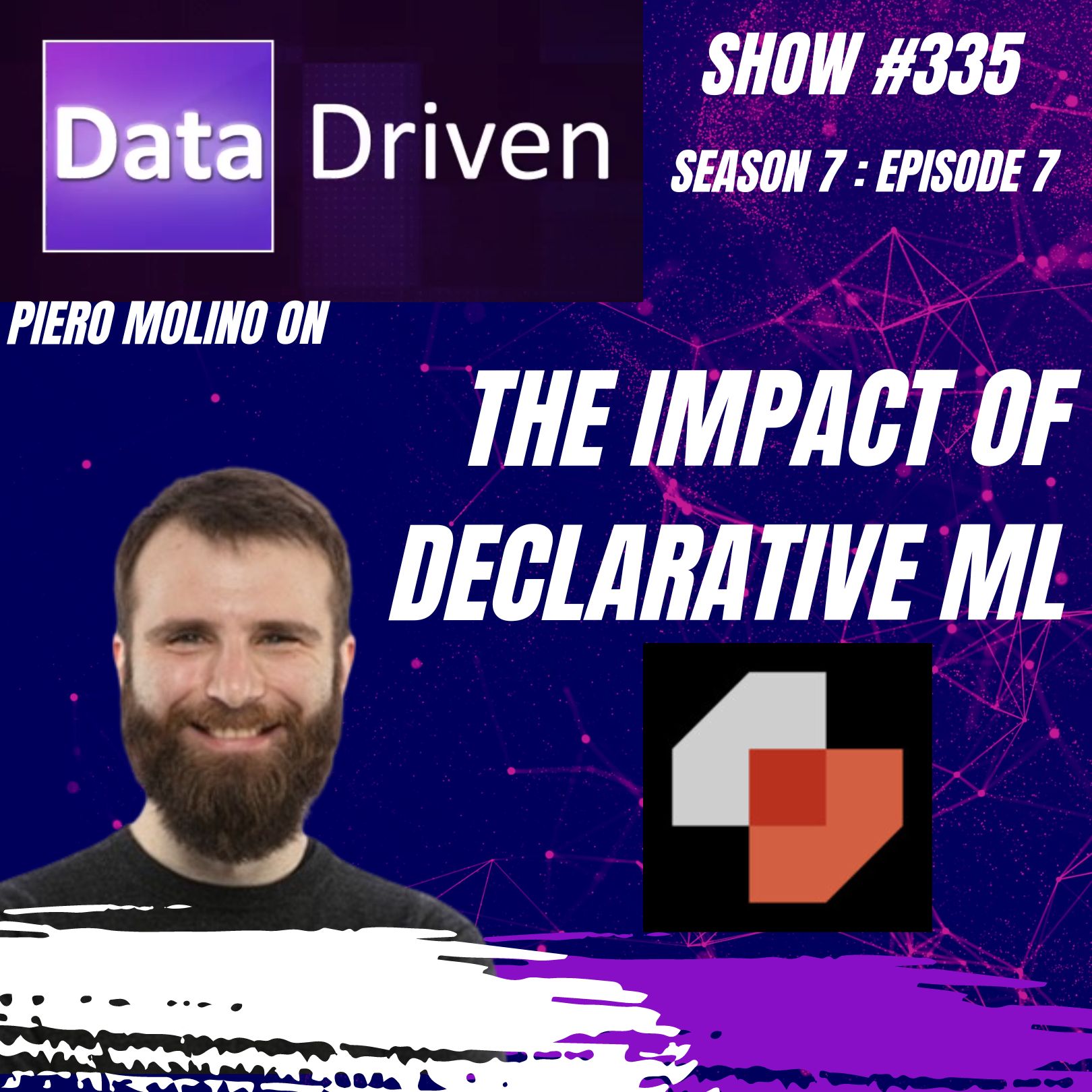

Welcome back to another episode of Data Driven! In today's episode, we have a special guest joining our hosts Andy Leonard, BAILeY, and Frank La Vigne. We are thrilled to have Piero Molino, an expert in declarative ML, sharing his insights with us. We'll be diving into the world of generative AI and exploring the two types of companies when it comes to adoption. Piero highlights the advantages and limitations of using APIs for quick solutions, shedding light on why owning the entire stack and platform is the next phase for companies. SPEAKER BIO Piero Molino, a renowned researcher and engineer, has made significant contributions to the field of artificial intelligence. He previously worked at Uber as one of the founding members of the Uber AI organization, where he spent four years conducting research and developing applications. During his time at Uber, Molino created Ludwig, an open source project that has become a foundational technology for many companies, including his own. Ludwig is recognized as one of the first machine learning systems that offer clarity and transparency. Molino's innovation and expertise have positioned him as a leading figure in the advancement of AI technologies. SHOW NOTES [00:01:07] Ageing well thanks to healthy lifestyle changes. [00:05:52] Declarative configuration for creating AI pipelines. [00:10:14] Built tool to streamline machine learning projects, shortened development time from a year to a week. [00:13:14] Deploying machine learning models should be easier. [00:19:42] Declarative ML: Trendy or in need of explanation? [00:23:40] Shortcut solutions may work, but lack knowledge. Building custom data models can be costly. Differentiation and progress with new product, Bradybase. [00:27:16] Customizable, automated solution between build and buy. [00:30:40] Larger organizations have a spectrum of machine learning applications, with some being more impactful than others. Evaluating the feasibility of smaller applications can be costly. Having a tool to test applications quickly would be beneficial. Uber had a similar experience with self-driving cars being the highest priority. [00:35:08] First-time CEO experiences changing priorities and challenges. [00:37:47] New breed of generative eye tools; interactive applications; computer graphics and machine learning; improved animation in sports. [00:41:04] Difficulty connecting transportation dots, still unresolved. [00:44:12] Audible super premium account for book recommendations. Eye-opening books on goals and time. [00:47:35] Encourage checking out predibus. Thanks for listening.


In this episode of Data Driven, Frank and Andy Leonard are joined by guest speaker Lauren Maffeo to discuss data governance from the ground up. The conversation revolves around the importance of data governance in relation to generative AI, copyright infringement, and protecting consumer rights. They explore topics such as the need for proactive cybersecurity measures, the challenges faced by startups in implementing data governance, and the cultural transformation required for successful implementation. Overall, it is a thought-provoking discussion that provides insights into the complexities and potential solutions related to data governance in today's data-driven world. MOMENTS 00:05:49 Civic Tech serves the public through technology. 00:07:50 Data governance: a holistic, cultural business strategy. 00:12:25 Data as tangible asset, managing as product. 00:14:38 Implementing data governance: start small, connect to business. 00:20:34 Data growth, lack of management, legislative progress. Clear framework for data quality needed. 00:25:14 Startups prioritize innovation for survival. Large industries restrict innovation due to regulation. Motivations and context are key in governance. 00:28:54 Data governance and copyright infringement in generative AI. The future of consumer rights and cybersecurity. 00:33:44 Encourage caution with sharing proprietary information 00:36:36 Bias in AI and data governance intertwined. Risk reduction, troubleshooting. Not all intent is negative. Challenges in data work solvable. Nonprofits and cybersecurity models for governance. 00:40:38 Encouraging shift in conversation about data governance. 00:44:34 Data found me, sparked interest in AI. 00:49:20 Technology saves time, allowing for more productivity. 00:54:03 Adopting foster pets: fun without long-term responsibility. 00:55:57 Connect on LinkedIn, visit Pragprov.com, feedback welcome.
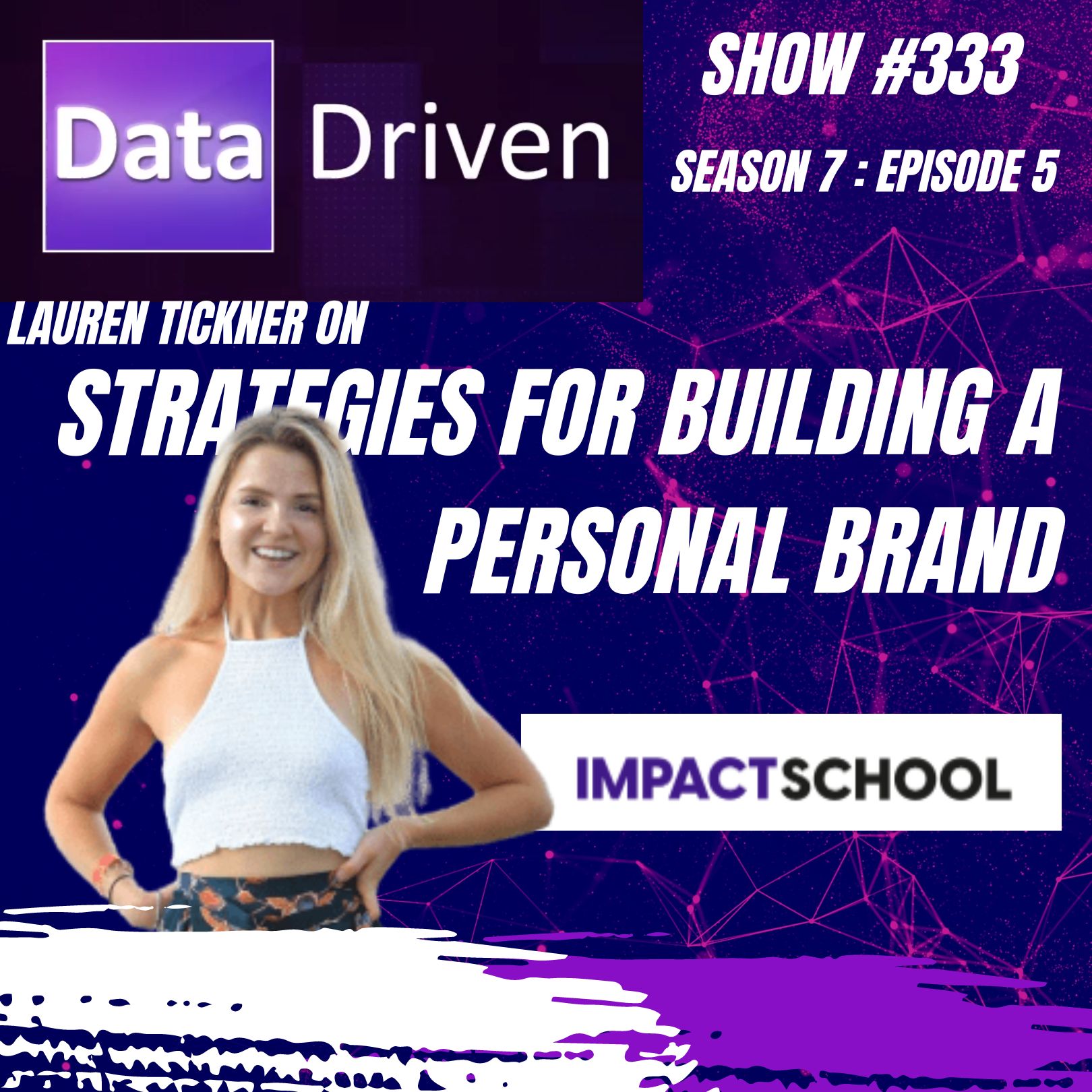

On this episode of Data Driven, BAILeY and Frank La Vigne welcome special guest Lauren Tickner to discuss strategies for maximizing time and success in the digital age. Lauren shares her insights on motivation, dealing with online haters, and the power of automation in business. The conversation delves into the importance of understanding risks and rewards, breaking free from traditional career paths, and the benefits of working in startups or entrepreneurial businesses. Lauren also provides valuable tips on social media content creation, utilizing storytelling and personalization to engage readers. Additionally, she introduces the PASTA framework for creating compelling social media posts and shares her approach to tracking and optimizing the client journey. MOMENTS [00:01:16] The podcast uses a British voiceover actor to differentiate from East Coast accents. An AI voice named Bailey was later used, which can now be animated. [00:06:19] Successful asset manager quits job to pursue fitness career using social media. Simplifies life and focuses on selling premium packages. Finds success with minimal monthly sales. [00:08:05] The speaker discusses their upbringing in New York and the pressure to work in the financial industry. They admire the listener's decision to break free from that path and simplify things. They also comment on the listener's sense of humor and social media presence. [00:13:00] To simplify social media content creation: automate posting to multiple platforms, identify 5 topics to focus on, add personal storytelling to engage readers, and include a call to action to prompt specific actions. [00:19:41] The text discusses creating and sharing content for three different audience groups based on their familiarity with the author. It suggests using different types of content for each group, such as introducing oneself to new audiences, showcasing expertise to familiar audiences, and offering opportunities to become clients. The author also talks about segmenting content into top, middle, and bottom of the funnel, and using different calls to action to gauge audience interest. [00:24:09] Data shows that clients who watch 2 case studies before joining stay longer. We track client journey and added quick welcome call within 4 hours of joining for positive experience. Pooled calendar allows immediate availability for calls. [00:27:46] The author explains their approach to managing their business, aiming for a smaller internal company and owning multiple businesses rather than having a large team and many clients. [00:31:58] We should focus on the potential benefits, not just the downsides. Make realistic lists of what could go right and wrong. Replace "time" with "life" to make better decisions. Consider leaving high-paid jobs for startups or entrepreneurial businesses. Showcase the value you can bring to companies. [00:34:17] The speaker finds the content interesting and praises the concept, emphasizing the key takeaway. They inquire about finding more information.
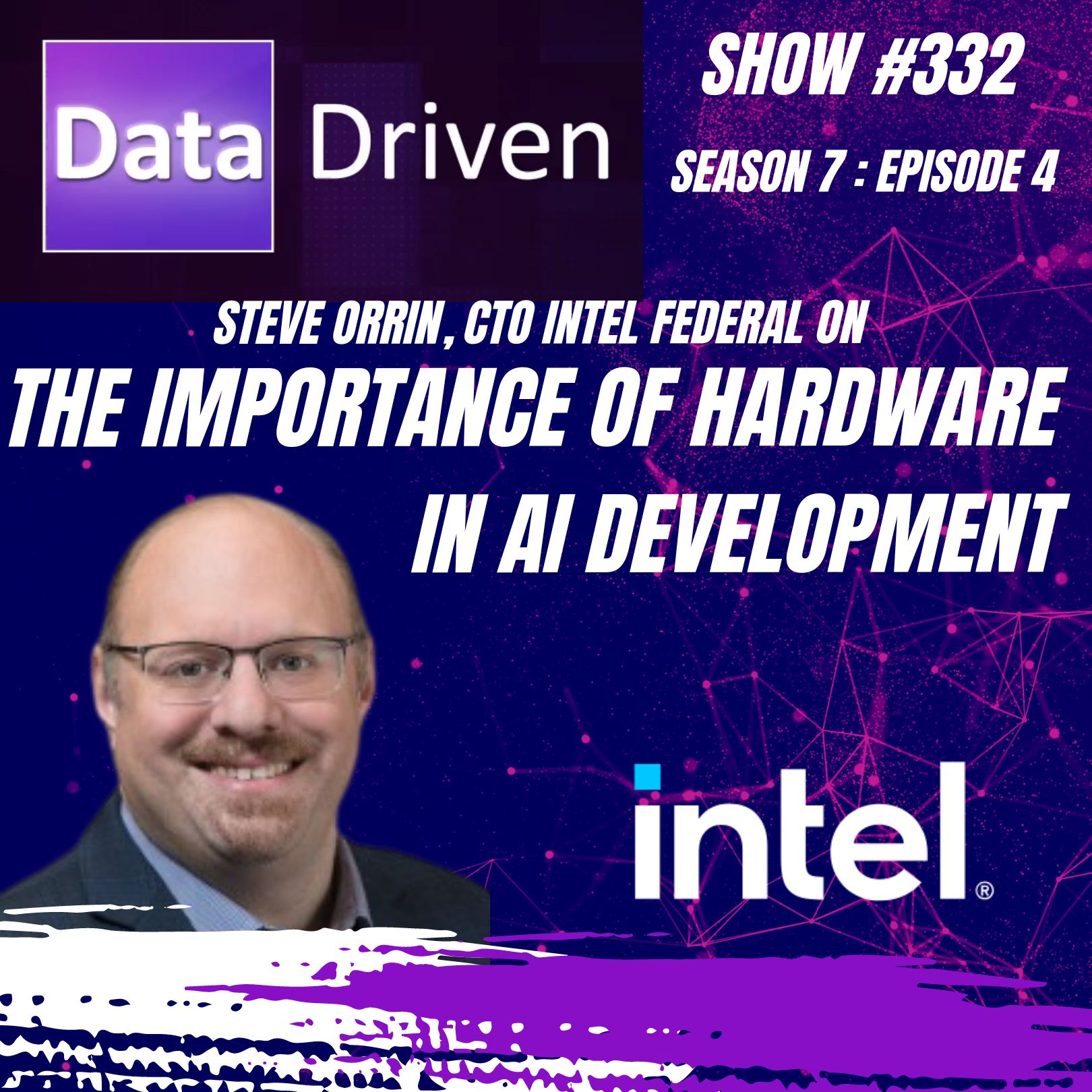

On this episode of Data Driven, the focus is on hardware from AI optimized chips to edge computing. Frank and Andy interview Steven Orrin, the CTO of Intel Federal. Intel has developed new CPU instructions to accelerate AI workloads, and FPGAs allow for faster development in custom applications with specific needs. The speaker emphasizes the importance of data curation and wrangling before jumping into machine learning and AI, LINKS __ __ MOMENTS 00:01:59 Hardware and software infrastructure for AI. 00:07:18 AI benchmarks show importance of GPUs & CPUs 00:14:08 Habana is a two-chip strategy offering AI accelerator chips designed for training flows and inferencing workloads. It is available in the Amazon cloud and data centers. The Habana chips are geared for large-scale training and inference tasks, and they scale with the architecture. One chip, Goya, is for inferencing, while the other chip, Gaudí, is for training. Intel also offers CPUs with added instructions for AI workloads, as well as GPUs for specialized tasks. Custom approaches like using FPGAs and ASICs are gaining popularity, especially for edge computing where low power and performance are essential. 00:19:47 Intel's diverse team stays ahead of AI trends by collaborating with specialists and responding to industry needs. They have a large number of software engineers focused on optimizing software for Intel architecture, contributing to open source, and providing resources to help companies run their software efficiently. Intel's goal is to ensure that everyone's software runs smoothly and continues to raise the bar for the industry. 00:25:24 Moore's Law drives compute by reducing size. Cloud enables cost-effective edge use cases. Edge brings cloud capabilities to devices. 00:31:40 FPGA is programmable hardware allowing customization. It has applications in AI and neuromorphic processing. It is used in cellular and RF communications. Can be rapidly prototyped and deployed in the cloud. 00:41:09 Started in biology, became a hacker, joined Intel. 00:48:01 Coding as a viable and well-paying career. 00:55:50 Looking forward to image-to-code and augmented reality integration in daily life. 01:00:46 Tech show, similar to Halt and Catch Fire. KEY TOPICS: Topics Covered: - The role of infrastructure in AI - Hardware optimization for training and inferencing - Intel's range of hardware solutions - Importance of software infrastructure and collaboration with the open source community - Introduction to Havana AI accelerator chips - The concept of collapsing data into a single integer level - Challenges and considerations in data collection and storage - Explanation and future of FPGAs - Moore's Law and its impact on compute - The rise of edge computing and its benefits - Bringing cloud capabilities to devices - Importance of inference and decision-making on the device - Challenges in achieving high performance and energy efficiency in edge computing - The role of diverse teams in staying ahead in the AI world - Overview of Intel Labs and their research domains - Intel's software engineering capabilities and dedication to open source - Intel as collaborators in the industry - Importance of benchmarking across different AI types and stages - The role of CPUs and GPUs in AI workloads - Optimizing workload through software to hardware - Importance of memory...
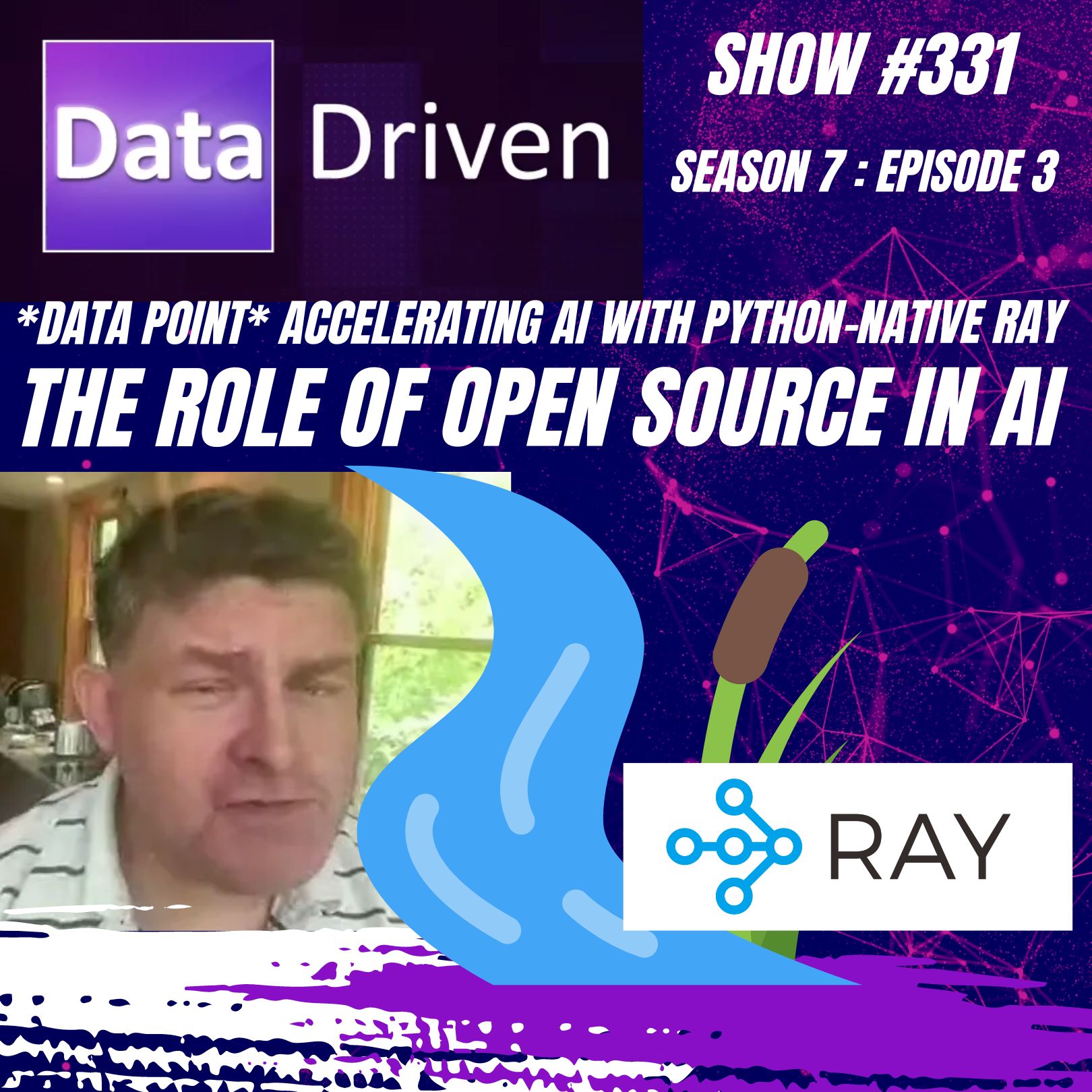

On this episode of Data Driven, we explore the topic of distributed computing frameworks for AI and ML workloads. Frank discusses the advancements of Ray, a new technology based on Python language, with performance enhancements that could range from 10-12 times faster to thousands of times faster in extreme cases. We delve into the power of open source artificial intelligence and how it can aid data endeavors to accelerate these efforts. Along the way, we touch upon IBM and Red Hat's partnership, the evolution of technology, the importance of problem-specific solutions, and more. Stay tuned for a new episode of "Data Driven" and a special segment from our speaker on the potential AI holds for our future. [00:01:50] Ray is a new computing framework for AI/ML, may replace Spark, based on Python, can free people from PySpark. [00:03:49] Speaker has a MacBook M2 and prefers it over Windows. They enjoy stream-side streaming and wrote an article prompted by a question at work about a new technology claiming to be the next big data processing framework. They believe Ray still has an advantage. [00:06:51] Webinar about power of IBM-Red Hat partnership in AI. Speaker mentions travel with family and introduces production assistant. [00:11:34] Tech anticipated, surprised by speed of Chat GPT. Some dismiss as a fad, but it's different from predictive text like comparing paper airplane to an Airbus A 380, based on same principles but very different in implementation and technology. [00:13:30] Encourage attendance at AI webinar showcasing ethical concerns. Open source needed for transparency and risk-sharing. AI impact on all, even entry-level jobs and economy.
